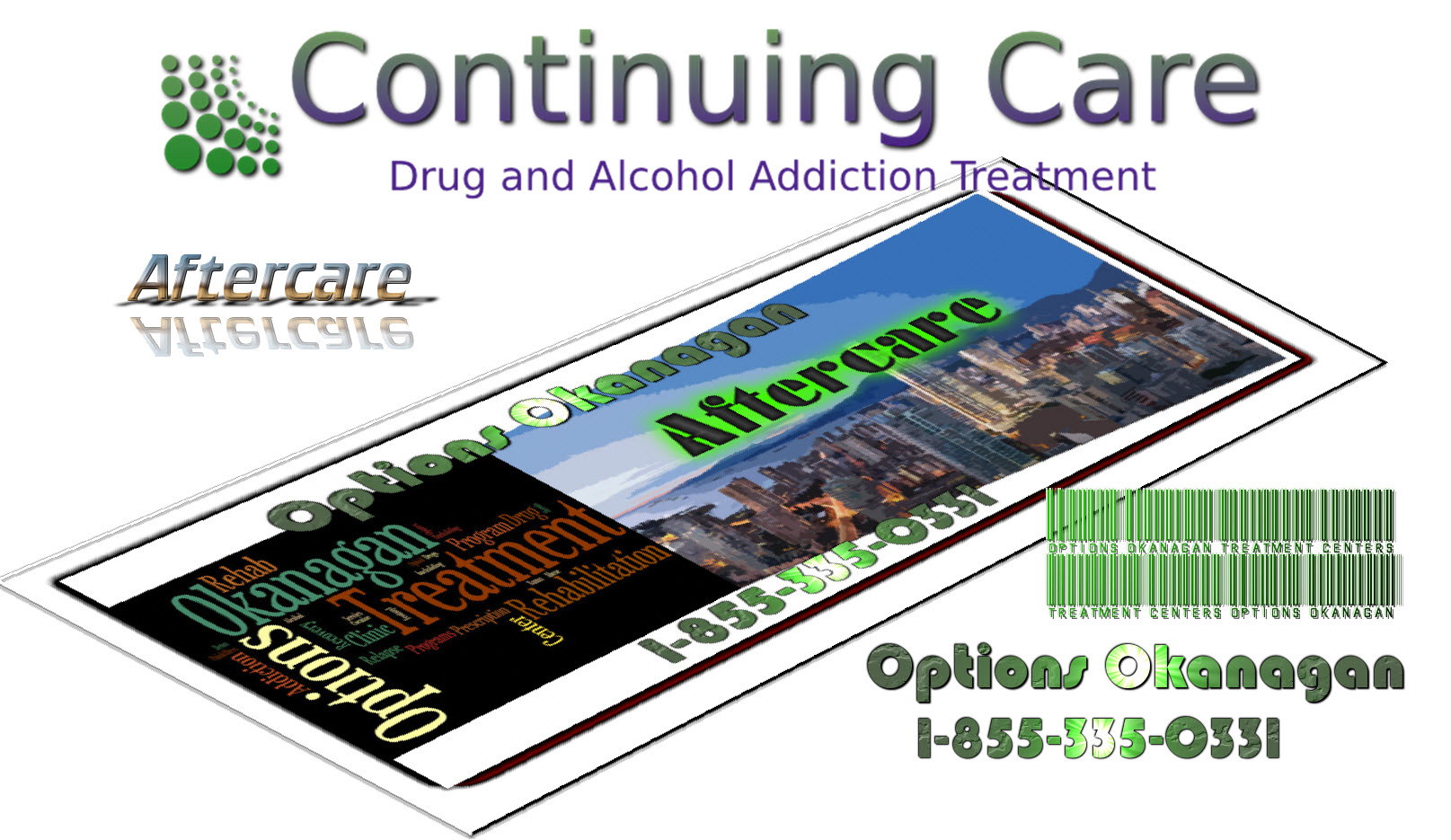Drug, opiate and alcohol rehab aftercare and continuing care in Vancouver, Victoria and
Kelowna, British Columbia – Options Okanagan Treatment Centers in Kelowna, British Columbia treating opiate and alcohol addiction and recovery.
It is a major accomplishment to complete alcohol or drug rehab. However, that doesn’t mean that there isn’t more work that needs to be done. During the weeks, months or even the years after rehab is completed, people in recovery still are at risk to relapse. The risk of falling into self-destructive patterns and returning to addictive behaviors in increased when the person has a co-occurring disorder – which is a mental health condition that is present alongside with a substance use disorder. An aftercare program can help with minimizing this risk and help you to continue to move forward towards a life that is completely free of drugs.
According to research that Psychiatric Services conducted, the quality of the specific aftercare that you receive may have a major influence on what your chances are for staying sober once you have finished your treatment. For any Dual Diagnosis recovery process, an aftercare plan should be integrated into a comprehensive treatment program. From the time that you first enroll in rehab for treating drug addiction, alcoholism, obsessive-compulsive disorder, bipolar, or depression, your treatment team needs to be prepared to help you in the days that follow your graduation. If you receive the right kind of therapeutic support and assistance, you have a good chance of maintaining your hard-earned sobriety and the opportunity for building a solid foundation for a full recovery.
Preventing Relapse
It is now recognized by addiction specialists that relapse is one of the hallmark symptoms of addiction. Also, if you happen to have a re-occurring disorder such as post-traumatic stress disorder, anxiety or depression, there can be an even stronger temptation to revert back into substance abuse in order to manage your symptoms. Aftercare’s main goal is preventing a relapse into alcohol or drug use. By providing group sessions, continuing counseling and other types of scheduled meetings, an added level of accountability is provided by aftercare and continuing care programs which helps to ensure that the patient doesn’t turn back on their old habits.
The following components have been identified by Alcohol Research & Health as being essential for effective relapse prevention programs:
Identify and learn about your triggers. Substance abuse can be triggered by many different psychological, social and environmental factors. A stressful public events, marriage conflict, flashback to an abusive situation or episode of depression can drive you to revert back to using alcohol or drugs. Learning how to identify your stressors should be part of your relapse prevention process.
Learn how to cope with cravings and stressors. After you graduate from rehab, you will be facing many situations that you might not have considered while you were in treatment. Things like moving into a new house, beginning a new relationship or getting a new job can all result in you being in an emotionally vulnerable state of mind. Support groups and counseling sessions can help you deal with these kinds of high-risk situations that you may encounter.
Think through a relapse’s outcome. Many recovering addicts revert back to alcohol or drugs expecting that the chemicals will help them feel better. Drugging and drinking in fact usually result in dangerous or unpleasant outcomes, like incarceration, losing a relationship, emergent medical treatment or an overdose. Participants are taught by a relapse prevention plan to evaluate possible outcomes of a slip up before any drugs are picked up or the first drink is taken.
Learn how to prevent a lapse from becoming a relapse. Having a minor slip doesn’t need to end up turning into a major relapse as long as you immediately seek help and take the necessary steps for getting back on track with your program. Since the chances of having a relapse are very high, it is critical to learn how to deal with an occasional slip if one does occur.
If a person does end up relapsing into their old behaviors, their aftercare program can help them to better assess and cope with the situation. The professionals and peers who are part of the aftercare support team can help to ensure that if a slip does occur that the individual doesn’t necessarily need to start all the way back to the beginning of rehab process once again.
Options Okanagan Opiate and Alcohol Treatment Centers in Kelowna, Salmon Arm and Vancouver, British Columbia – Men and Women are recovering and healing from Alcohol and Drug Abuse at our treatment center here in the Okanagan right now.
Our unique and distinctive Opiate Drug and Alcohol treatment program allows men and women to come in from Calgary as well as Edmonton as we offer airport pickup.
Numerous clients come to us from Vancouver, Calgary and Edmonton and other locations in Alberta and even other provinces for Opiate addiction treatment, heroin drug treatment, many other drug and alcohol addictions for rehabilitation because of the uniqueness of our treatment center.
Our Treatment Location:
Options Okanagan Opiate Treatment Center
551 Sherrydale Crescent, Kelowna, British Columbia, V1V 2E6
Toll Free Phone Number : 1-855-335-0331




